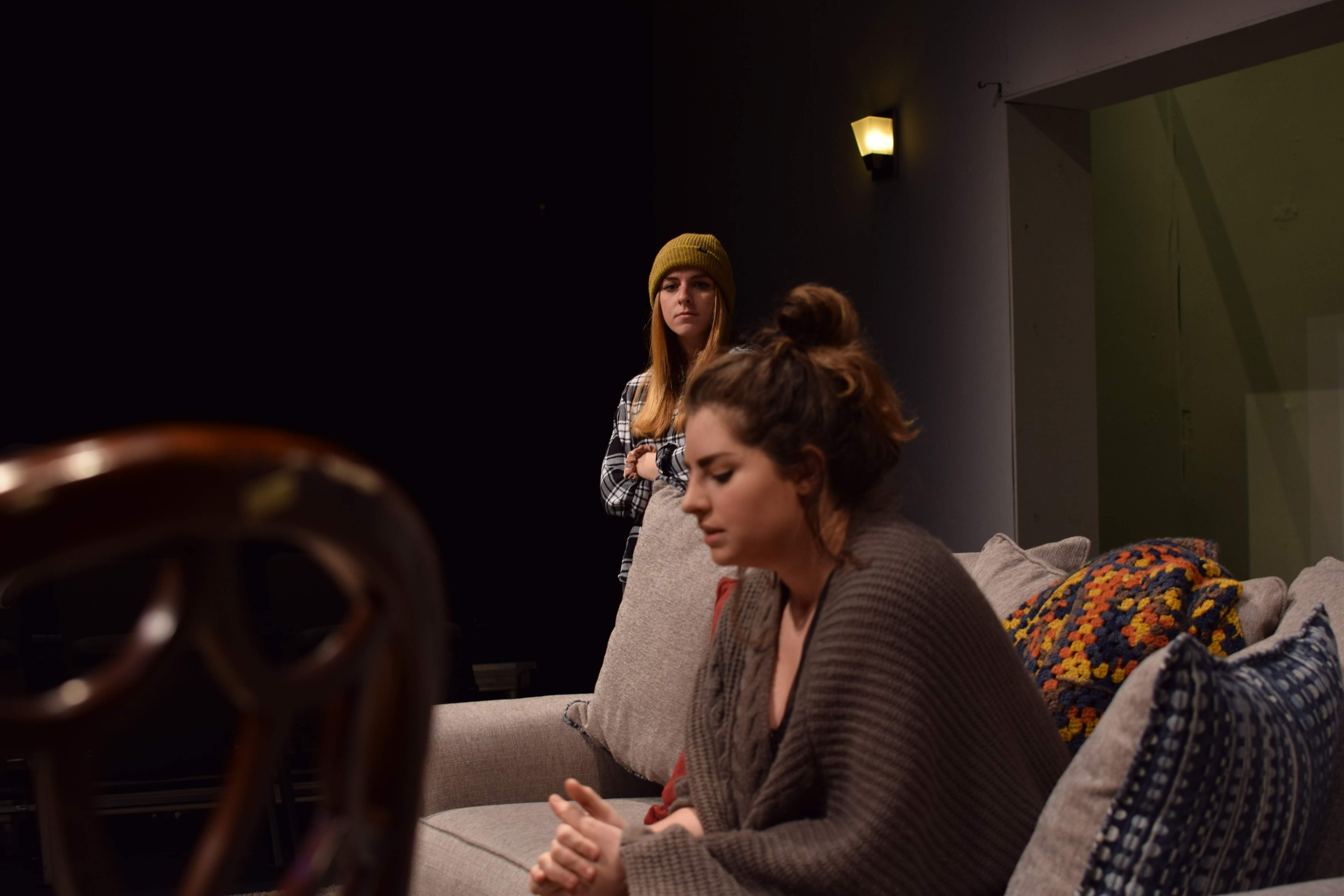

Grace (Audrey Nigh), back, looks on at her mother, Mary (Katelyn Donnelly).
Josiah Martin | Arts and Entertainment Editor
01/30/20
The Red Masquers have once again proven the stunning dramatic talent here at Duquesne with The C-Word.
In this show, writer Olivia LeSuer, a Duquesne Student, has created three characters who want so badly to connect with each other but are in denial about their own inability to do so.
This creates seemingly unhealable rifts between them. All the while, past and present struggles with mental health make it harder for them to connect, as they bob and weave past the uncomfortable subjects they most desperately need to discuss. It’s riveting theater and indicative of the talent of LeSuer and director Justin Sines.
The three actors that make up the cast of The C-Word — Katelyn Donnelly as Mary, Audrey Nigh as Grace and Christian Poach as David — deserve immeasurable praise for the hyper-realistic tone and well-paced dialogue. I cannot overstate the degree to which their arguments feel like real fights. Do you remember when you’d sleep over at a friend’s house, and you’d be horribly uncomfortable because they’d start arguing with their mother? The cast and crew has captured that here — and it works incredibly well.
Donnelly and Nigh’s near-constant conflict throughout the show is portrayed expertly. Donnelly brings a perfect I’m-not-mad-just-disappointed tone to her character. Nigh gives Grace a thick layer of intense frustration and rage over a barely-hidden mountain of fear and insecurity. The two’s comedic timing together and on-stage chemistry is undeniably perfect for LeSuer’s dialogue.
Poach’s portrayal of David may have been my favorite character in the show. His inability to truly understand Grace or Mary is heartbreaking, and his accompanying lack of empathy for them is a fantastic source of tension. Poach is riveting and believable in the role. His request for a “bowl of ice” and the awkward minute that follows is one of the funniest bits in the whole show, as well as one of he and Donnelly’s finest moments.
The Masquers consistently make good use of the potentially claustrophobic blackbox Genesius theater. The C-Word is no exception. It takes place primarily in the living rooms of the main characters, with changing throw pillows and wall decor signifying the change in setting from one character’s home to another. It’s simple but effective, and the audience sitting along the sides of the thrust stage enjoys a particularly immersive view of the action, a testament to both Sines’ directing and Luke Kenyon’s set design.
Some aspects of the play, however, felt underdeveloped. David’s living room is littered with unexplained pots of poinsettias. They are such a prominent and out-of-place presence in his blue and gray living room that the line “these are all from the church” seems wildly insufficient, and the flowers are only addressed in passing otherwise.
The flowers are merely one piece in what appears to be the show’s general confusion as to David’s purpose as a character. The reasons for his rocky relationship with Mary and Grace are explicitly stated. It’s clear he’s not a good guy. Despite this, his attempts to reconnect with Grace seem genuine, and often successful. This makes David’s final scene rather disappointing, as it doesn’t line up with the growth and change we see in him up to that point.
Additionally, the show’s final scene revolves around the repetitive, chirping annoyance of a malfunctioning smoke detector. Overall, the story is dynamic and dialogue-driven until it inexplicably ceases to be, and this random object’s noise acts as a catalyst for the plot’s resolution. It’s an unfortunate near-MacGuffin that robs the characters of their agency and autonomy in the play’s most vital moment. Luckily, Donnelly and Nigh’s spectacular performances re-inject the missing depth in the remainder of the scene.
It would be impossible to discuss The C-Word without talking about how well it handles its sensitive subject matter. Grace’s frankness and dark sense of humor regarding her experiences is a refreshing take. Suicide and self-harm are not ignored or treated with unrealistic reverence. These characters talk about these issues the way that people would. I cannot recommend this show enough.



